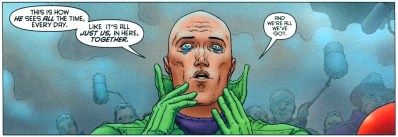You know what I hate most about comic book movies and TV shows? They really, really wish they weren’t based on superhero comic books. Sure, comics can give them the characters and story material for some of the highest grossing films of all time and the most successful Netflix shows, but let’s not mention the source material, eh?
This isn’t new, of course. I’m put in mind of the Tim Burton quote in his feud with Kevin Smith, “Anyone who knows me knows I would never read a comic book”, says the two-time Batman director. More recently however, I saw it in Jessica Jones on Netflix (Daredevil was somewhat guilty of this, too).
One of the big draws of Jessica Jones was that it was part of the “Marvel Cinematic Universe”, which basically means it set in the same world as Robert Downy Jr’s Iron Man and Chris Evans’ Captain America. Though it would never happen, it’s entirely feasible within the show that either of these characters could actually make an appearance, and can be referenced in-show. Except Jessica Jones really doesn’t like referencing superheroes. The Hulk is “the green guy” and Captain America is “the flag-waver.” Jessica Jones hates superhero characters so much it can only actually reference them euphemistically, even though a big selling point of the show is that it co-exists with said characters.
Now, on its own I don’t really care about that. The showrunners are clearly going for a particular aesthetic and tone and are keeping as far way from the capes and costumes brigade as possible in order to achieve that. Literally nothing in Jessica Jones would have been any different if it wasn’t connected to the MCU, meaning the connection it does have is nakedly commercial in nature. Say its part of the MCU and you get +X more viewers.
What this really makes me think about is how superheroes evolved from popular, pulpy kids entertainment to being dominated by 18-40 year old men. How this audience seems to need to legitimise the stories by making them as brutal and bleak as possible. “Look, comics aren’t just for kids! This woman got raped, see? This is mature stuff.” But it isn’t mature stuff. It’s juvenile, usually. Bendis got it right with Alias, but for every Alias there’s two Identity Crisis or Superman breaks someone’s neck.
I liked Jessica Jones. I think its a great story of PTSD and surviving abuse and coming out the other end. I think its a great story of not being defined by your abuse or abuser. And I even think linking in the superhero aspect lends proceedings a certain power. I’m just not so sure it should be in the same world as Ant-Man and Rocket Raccoon. My 4-year-old son loves Guardians of the Galaxy, you know? (I censor when appropriate). But I’m betting that come Infinity War we’ll have Daredevil and Jessica Jones in the same shot as Rocket Raccoon and Groot and now I’m totally with the JJ showrunners – they don’t belong in the same place.
This isn’t me saying comics shouldn’t ever deal with these kinds of issues. Of course it isn’t. But I do question the wisdom of superhero comics looking at these issues, especially while they double down on corporate synergy and link everything together for good or ill. There’s a longer entry in here about the nature of franchises, corporate ownership and stewardship of characters. Remind me to write it?

